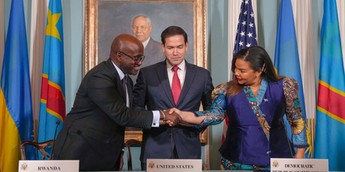Rwanda and the Democratic Republic of Congo (DRC) convened the inaugural session of their Joint Oversight Committee on Thursday, marking a significant milestone in the implementation of a peace agreement signed in June 2025 under the auspices of the United States, Qatar, and the African Union.
The meeting, held in Washington, was designed to review progress and resolve disputes relating to the peace accord, which aims to end long-standing hostilities in the resource-rich eastern region of Congo, a region marred by conflict and critical to the global supply of minerals such as cobalt, tantalum, copper, lithium, and gold.
Brokered by the administration of U.S. President Donald Trump, the June agreement built upon a 2024 commitment that included the withdrawal of Rwandan troops from eastern Congo within 90 days, the creation of a joint security coordination mechanism within 30 days, and the activation of a monitoring plan for troop withdrawals, all within a three-month framework.
However, despite the successful launch of the oversight committee, several key commitments remain unfulfilled. Notably, joint security coordination meetings have not taken place, and military operations against the Democratic Forces for the Liberation of Rwanda (FDLR), a rebel group operating in eastern Congo, have yet to begin. The FDLR includes elements linked to Rwanda’s 1994 genocide and remains a central source of tension.
U.S. senior Africa adviser Massad Boulos defended the process, stating that the agreement remains “on track” and that a meeting of the security coordination mechanism would be announced shortly. Boulos noted that although some timelines have slipped, the progress made since April has been “extensive” and aligned with the broader objectives of the peace framework.
Still, military and diplomatic sources acknowledged delays and rising tensions. Armed groups, including the M23 rebels and local militias known as Wazalendo, have reportedly fortified their positions along frontline territories, raising concerns over the fragile state of the ceasefire.
While the peace deal’s foundation remains intact for now, stakeholders stress the urgent need for accelerated implementation to prevent renewed conflict and ensure long-term stability in the Great Lakes region.

